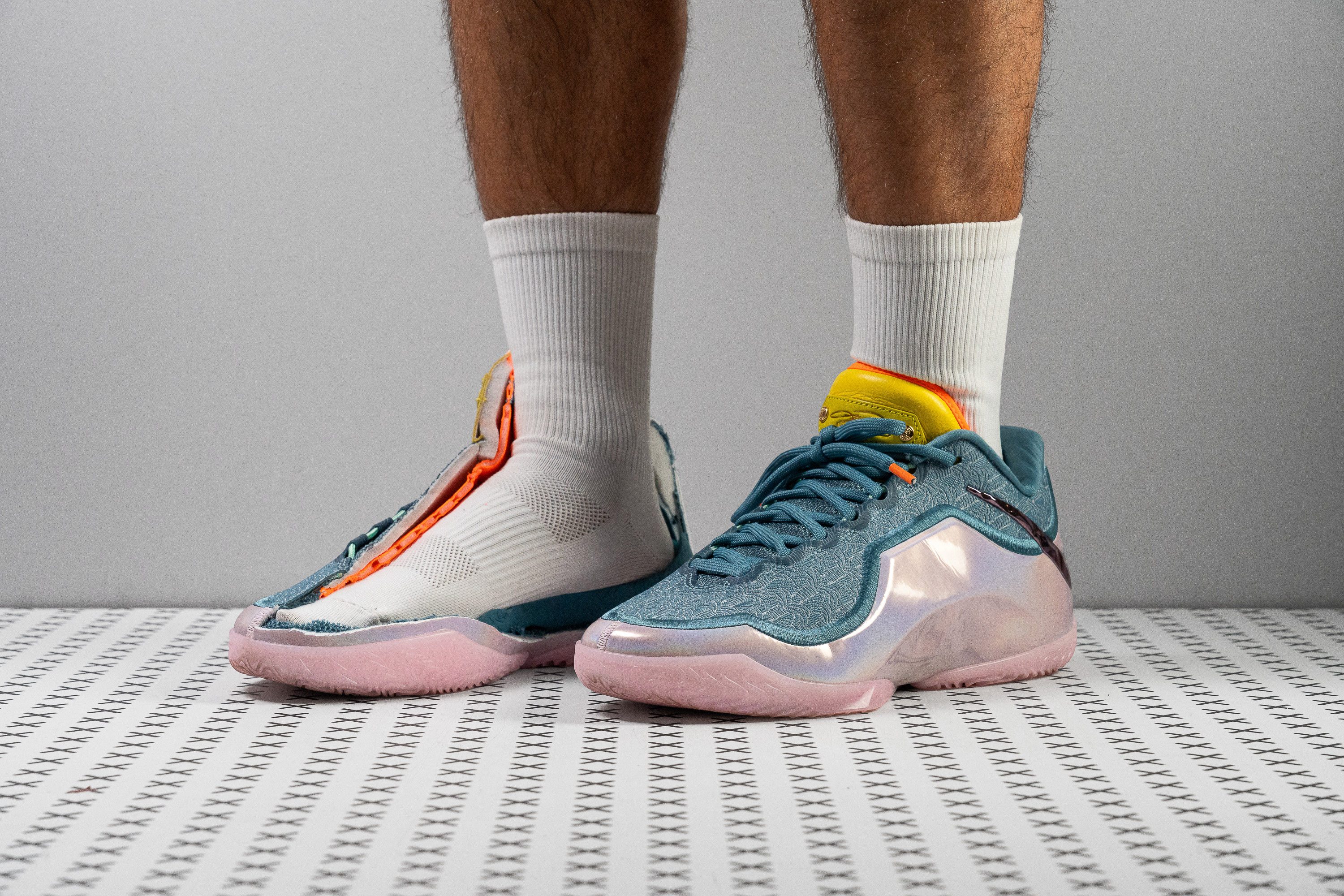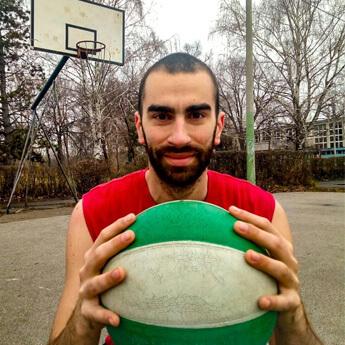Our verdict
- Top pick in best basketball shoes
- Top pick in best basketball shoes for ankle support
Pros
- Outstanding energy return
- Excellent shock absorption in the heel
- Fantastic outsole traction
- Top-tier stability and ankle support
- Highly secure foot lockdown
- Exceptional durability
- Decent flexibility given the design
- True to size and width
Cons
- Still one of the heaviest
- Not for outdoor courts
- Extremely low toebox height
- Not breathable
- Rapid price increase
Audience verdict
- Top 21% most popular basketball shoes
Comparison
The most similar basketball shoes compared
+ + Add a shoe | |||||
|---|---|---|---|---|---|
| Audience score | 85 Good! | 84 Good! | 89 Great! | 83 Good! | |
| Price | £185 | £100 | £190 | £180 | |
| Signature | LeBron James | LeBron James | - | Michael Jordan | |
| Shock absorption | High | Low | Moderate | Low | |
| Energy return | High | High | High | Moderate | |
| Traction | Moderate | High | Moderate | High | |
| Top | Low | Low | Low | Low | |
| Ankle support | ✓ | ✓ | ✓ | ✓ | |
| Weight lab | 15.5 oz / 439g | 15.1 oz / 428g | 11.8 oz / 335g | 15.5 oz / 439g | |
| Lightweight | ✗ | ✗ | ✓ | ✗ | |
| Breathability | Warm | Warm | Warm | Warm | |
| Outsole durability | Good | Good | Good | Decent | |
| Drop lab | 7.7 mm | 6.2 mm | 5.5 mm | 4.9 mm | |
| Heel stack lab | 31.1 mm | 27.4 mm | 27.0 mm | 25.4 mm | |
| Forefoot | 23.4 mm | 21.2 mm | 21.5 mm | 20.5 mm | |
| Size | True to size | True to size | True to size | Half size small | |
| Midsole softness | Soft | Soft | Soft | Soft | |
| Stiffness | Moderate | Moderate | Stiff | Moderate | |
| Torsional rigidity | Stiff | Moderate | Stiff | Stiff | |
| Heel counter stiffness | Stiff | Stiff | Flexible | Moderate | |
| Width / fit | Wide | Wide | Medium | Medium | |
| Toebox width | Medium | Medium | Medium | Wide | |
| Midsole width - forefoot | Average | Average | Average | Average | |
| Midsole width - heel | Average | Average | Narrow | Narrow | |
| Heel padding durability | Good | Decent | Bad | Good | |
| Toebox durability | Good | Decent | Decent | Decent | |
| Insole thickness | Very thick | Average | Average | Average | |
| Outsole hardness | - | - | Hard | - | |
| Outsole thickness | Average | Average | Average | Average | |
| Heel tab | None | Pull tab | None | None | |
| Ranking | #34 Bottom 37% | #35 Bottom 35% | #13 Top 25% | #40 Bottom 25% | |
| Popularity | #11 Top 21% | #32 Bottom 40% | #3 Top 6% | #2 Top 4% |
Who should buy
Centres, power forwards, and bigger players in general are still the primary target audience for the Lebron 23. However, this iteration specifically caters to the following:
- advanced players who are ready to pay the premium price for a high-end signature shoe
- hoopers with explosive playing styles who appreciate more energy return
- ankle rollers who rely on secure foot containment and lateral support, as well as players with past injuries
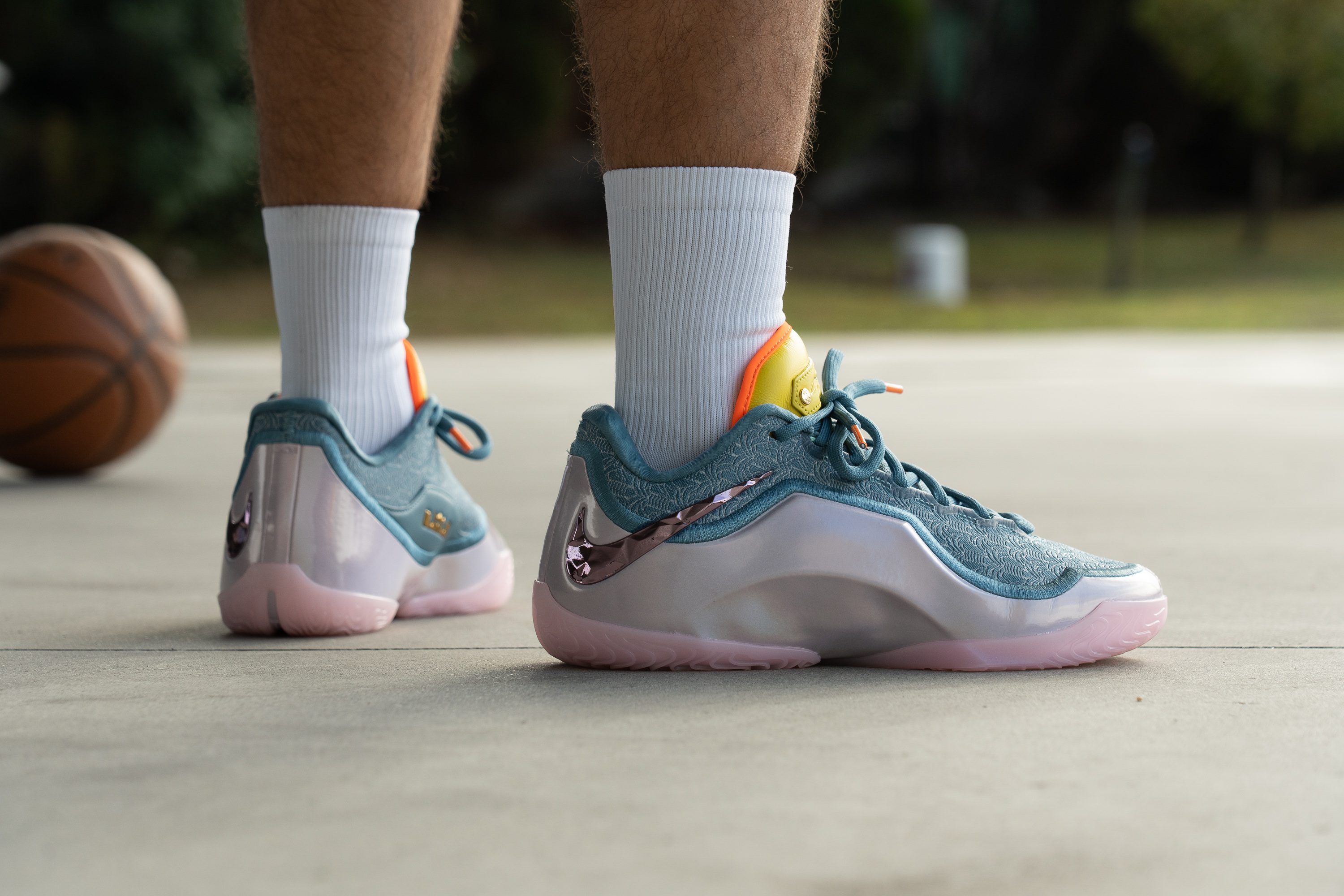
Who should NOT buy
The LeBron 23's eye-watering price point can be a turnoff for many players. But gladly, there are some great alternatives from Nike and other brands.
The Nike G.T. Hustle 3, for example, is packed with exceptional shock absorption and energy return but in a much lighter and slightly cheaper package. And if a balance of cushioning and ankle support is important to you, try the Adidas Harden Vol. 9.
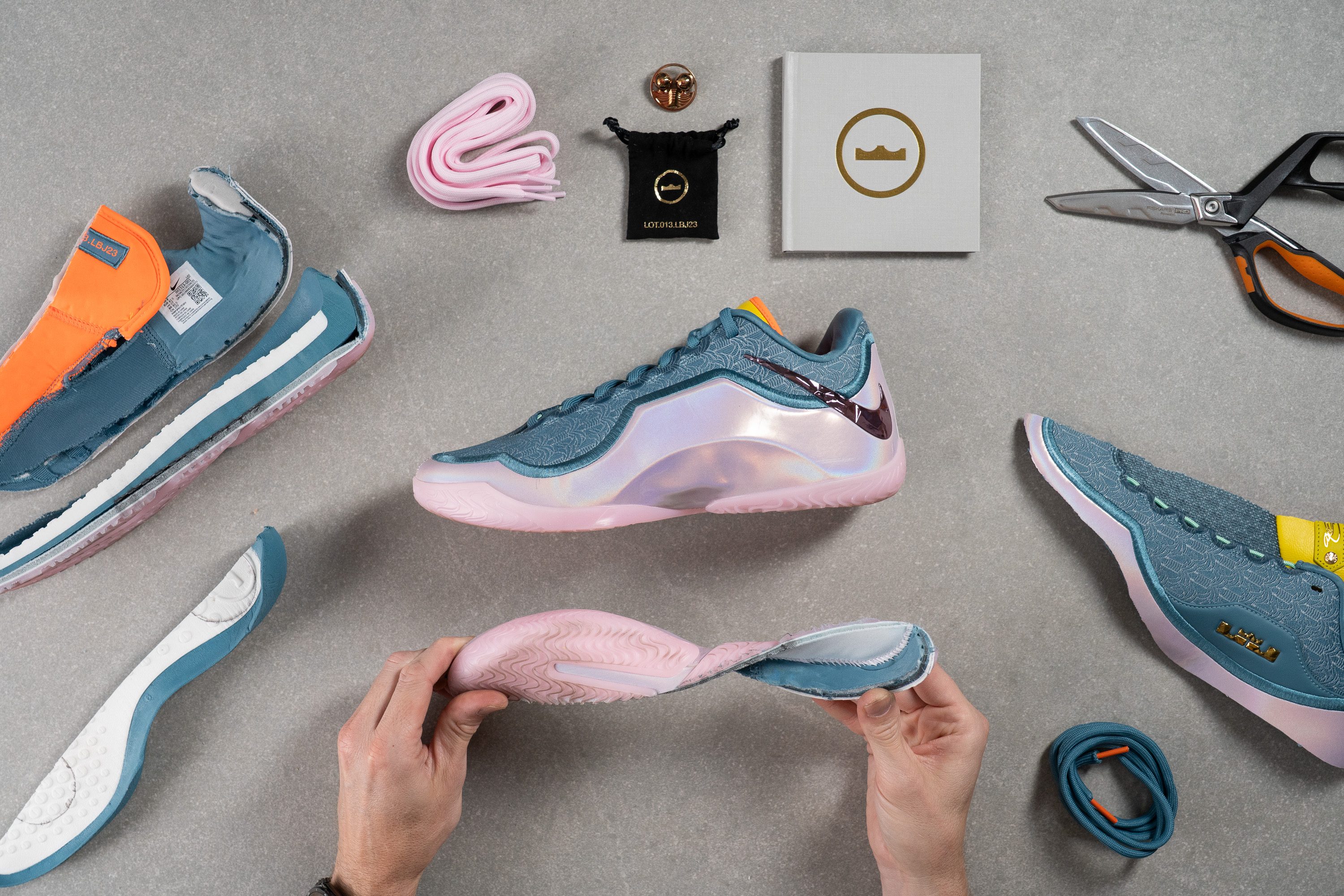
Cushioning
Shock absorption
With all Zoom Air units completely gone from the 23rd Nike LeBron, the shoe now relies on a dual-density midsole with a full-length ZoomX foam inside a Cushlon 3.0 carrier foam. But let's see how that reflects in this shoe's ability to protect the player's foot from impact.
Measuring its shock absorption in the heel, we were happy to see an increase over the LeBron 22 (104 SA) with its above-average reading of 112 SA! This is ideal protection for big guys like The King.
But on the downside, the absence of a pressurised air unit in the forefoot decreased the shoe's impact protection in this area quite significantly, dropping from 74 SA to a very low point of 57 SA. Not the best news for hoopers who expect good cushioning for the ball of the foot and the toe joints.
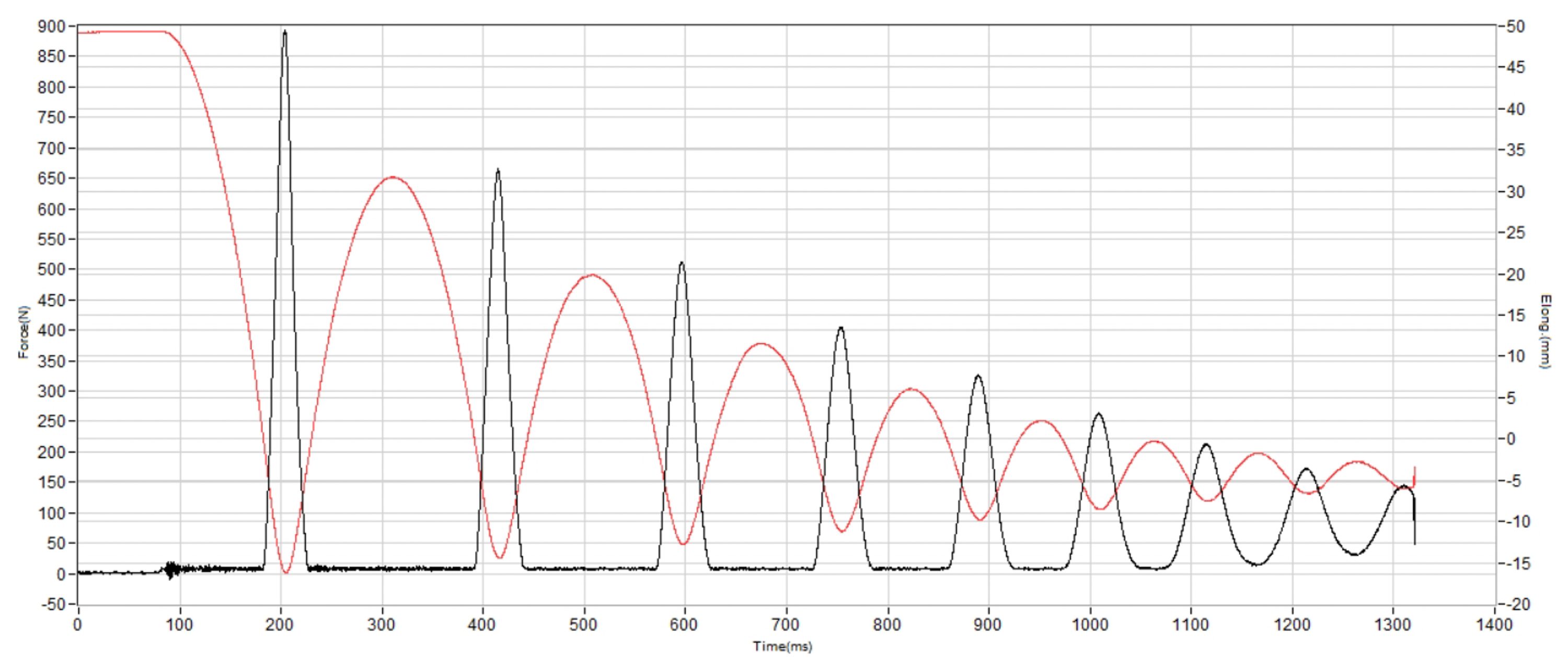
| LeBron 23 | 112 SA |
| Average | 103 SA |
Energy return
But what's the benefit of the new cushioning setup then? The answer lies in its 'unreal bounce,' as described by Nike.
A mix of the brand's miraculous Pebax-based ZoomX and a midfoot carbon fibre plate results in exceptionally high energy return of 70.4% in the heel and 72.1% in the forefoot! With both measurements scoring much higher than average (and higher compared to the previous LeBron 22), you can expect an excellent rebound for jump shots, layups, aggressive drives, dunks, and everything in between!
With its springiness comparable to another flagship signature shoe, the Air Jordan XXXIX, the LeBron 23 makes its way straight to our recommendations of shoes for jumping.
| LeBron 23 | 72.1% |
| Average | 62.1% |
Heel stack
The new approach to cushioning raised the LeBron 23's stack height by just a couple of millimetres, reaching 31.1 mm in the heel. However, it is still very close to the average, which is not a tangible difference for most players.
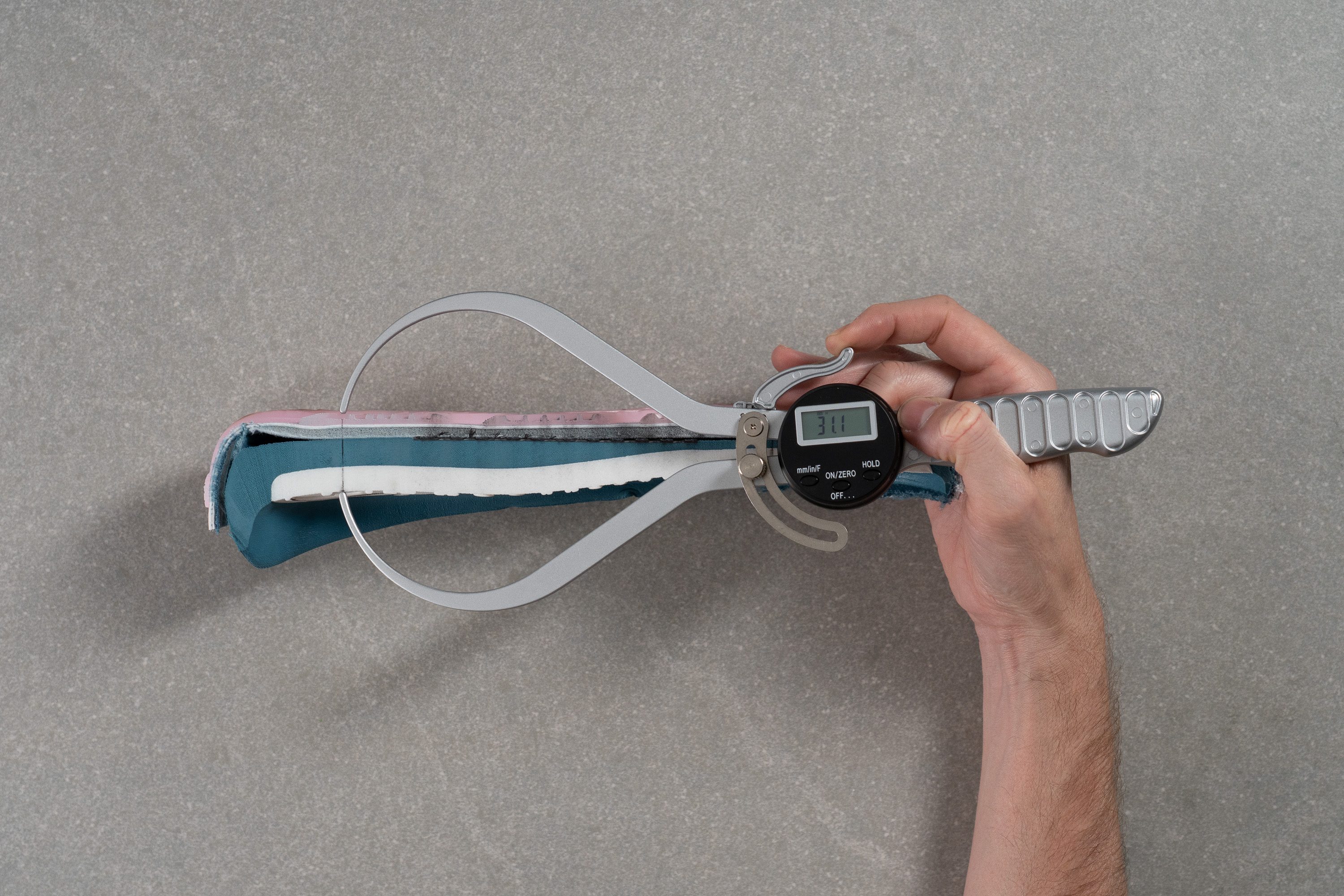
| LeBron 23 | 31.1 mm |
| Average | 28.8 mm |
Forefoot stack
The forefoot stack also rises slightly above the average at 23.4 mm, but it feels fairly grounded without a Zoom Air unit inside.
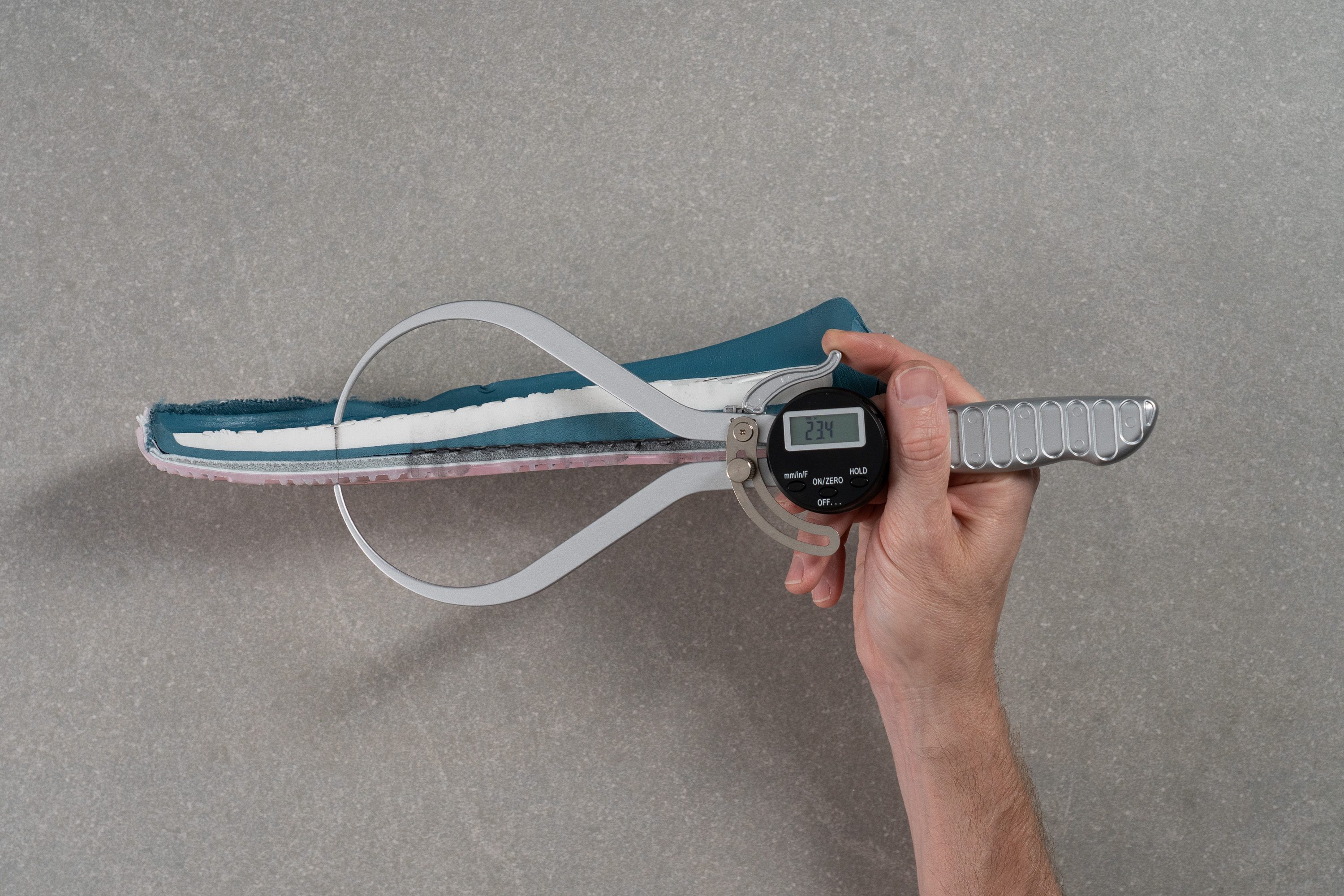
| LeBron 23 | 23.4 mm |
| Average | 21.4 mm |
Drop
The shoe's heel-to-toe drop remains on par with the average at 7.7 mm.
It is an optimal setup for basketball as it keeps the heel slightly elevated to give it more cushioning and reduce the load on the Achilles.
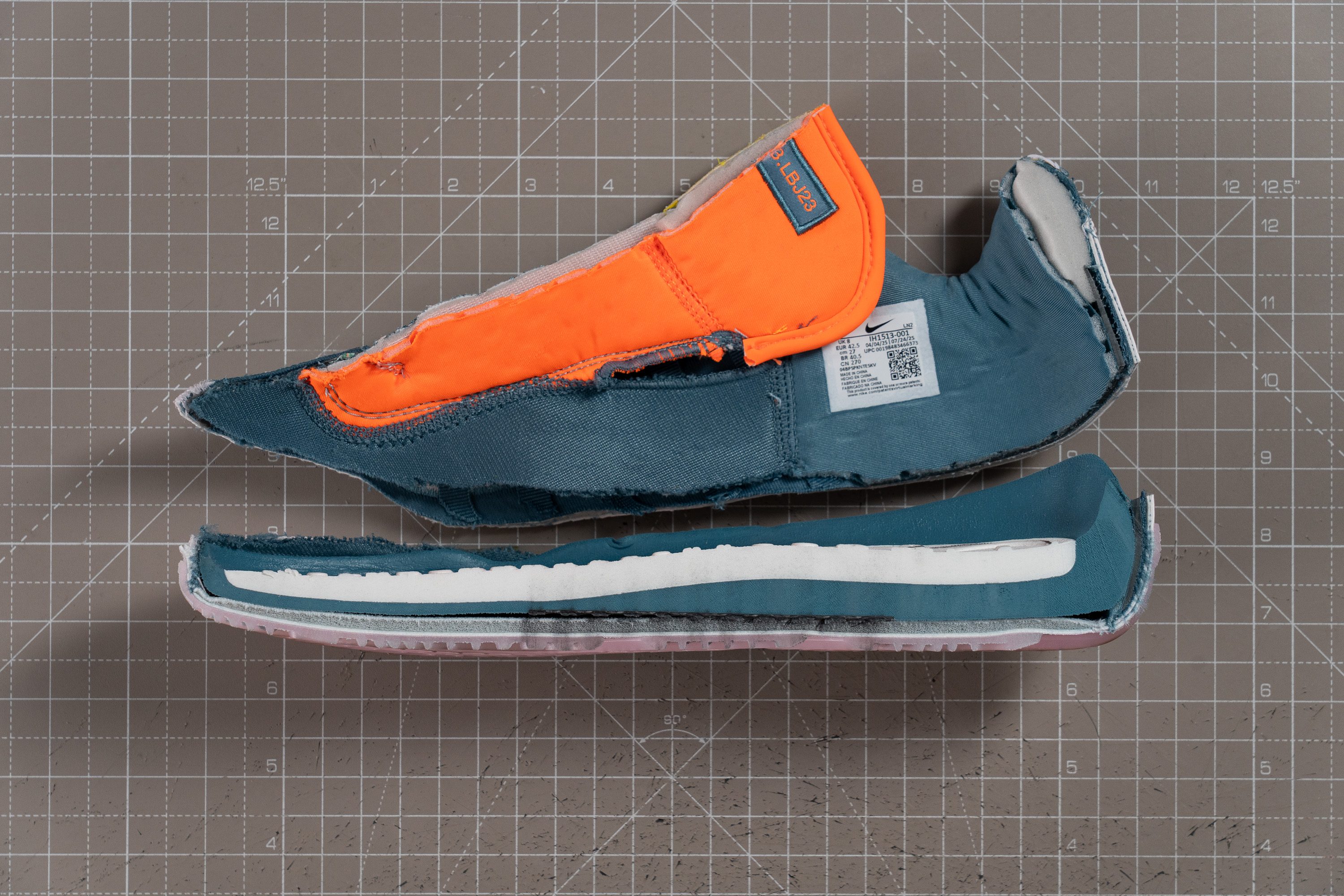
| LeBron 23 | 7.7 mm |
| Average | 7.4 mm |
Midsole softness
Although we wouldn't describe the Nike LeBron 23 as a soft shoe by any means, its ZoomX foam layer offers a very plush step-in feel.
Being well familiar with this premium blend from Nike's running shoes, we weren't surprised to record a very soft measurement of 14.0 HA on our durometer. It is significantly more forgiving than the average basketball shoe foam.
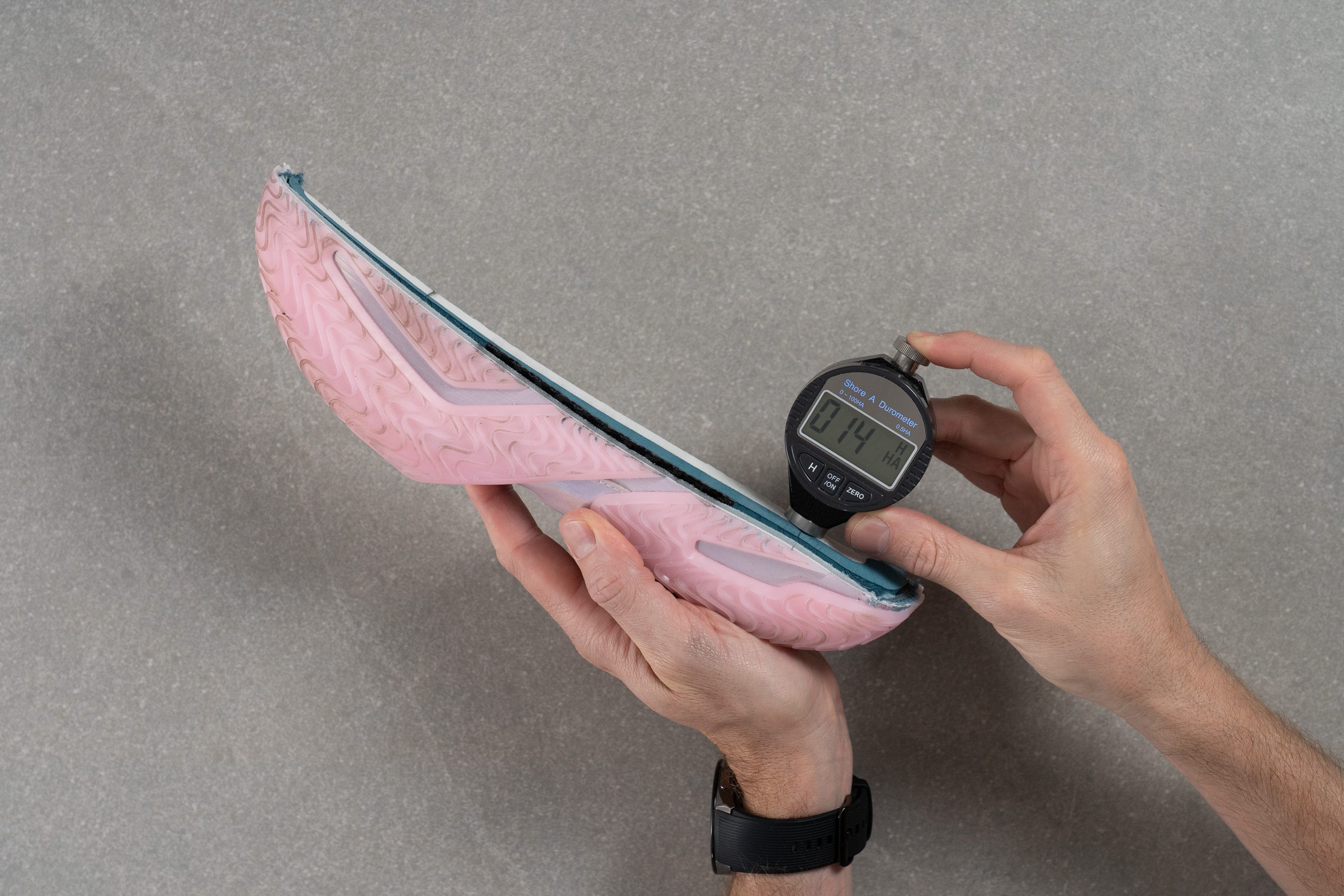
| LeBron 23 | 14.0 HA |
| Average | 24.3 HA |
Secondary foam
A firmer Cushlon 3.0 foam encloses the ZoomX. With a higher durometer reading of 19.5 HA, it helps to stabilise the ride and make it feel more controlled.
Its edges extend up to form a cradle for the foot for better containment.
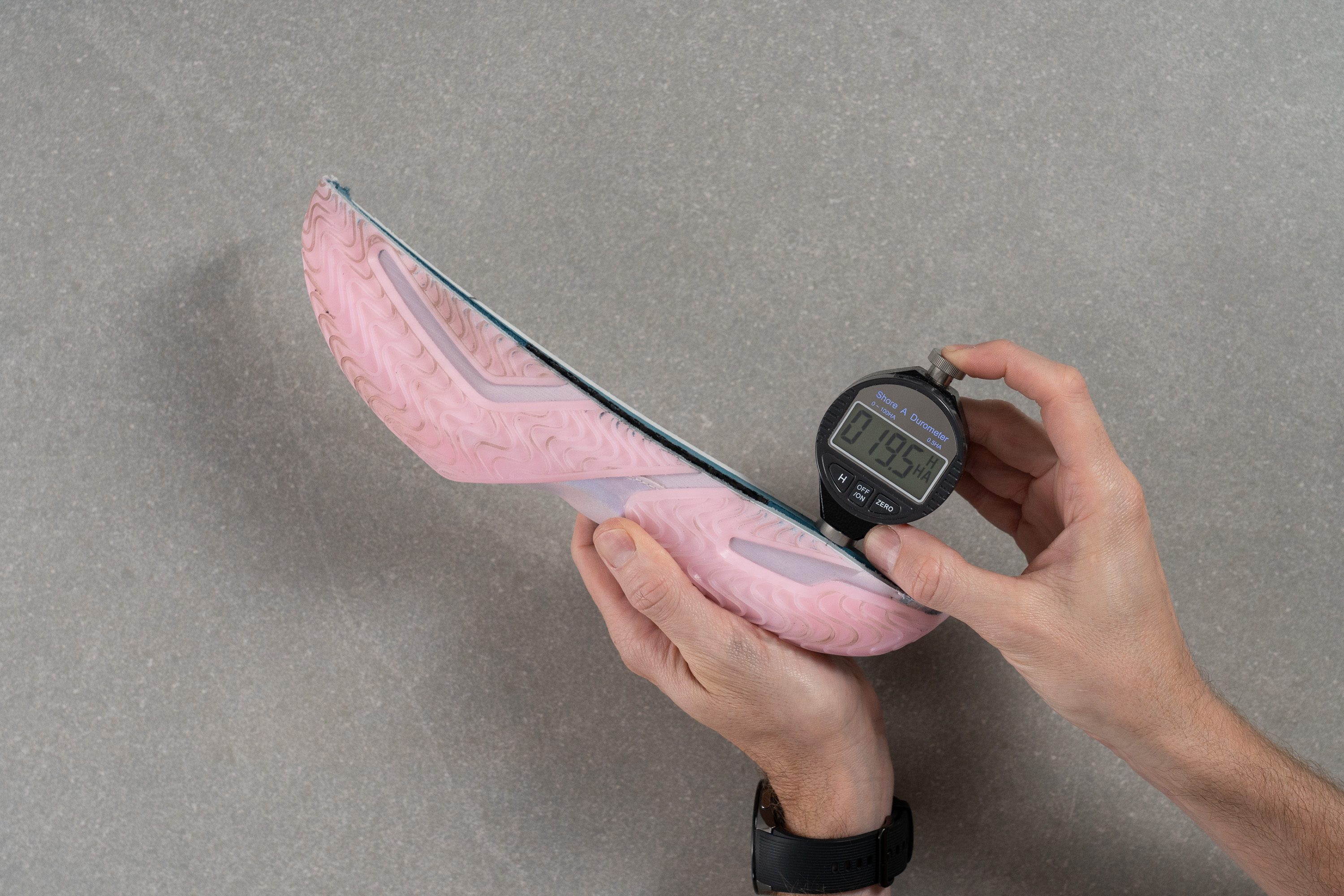
| LeBron 23 | 19.5 HA |
| Average | 27.7 HA |
Size and fit
Size
Nike LeBron 23 fits true to size (31 votes).
Width / Fit
It may seem like the shoe's massive sidewalls constrict the fit, but luckily, that's not the case.
Having created a mould of the LeBron 23's forefoot with the help of our proprietary gel, we found that its fit is roomier than it seems.
Showing an above-average measurement of 96.2 mm in the ball of the foot area, the shoe even makes it to the wide range!
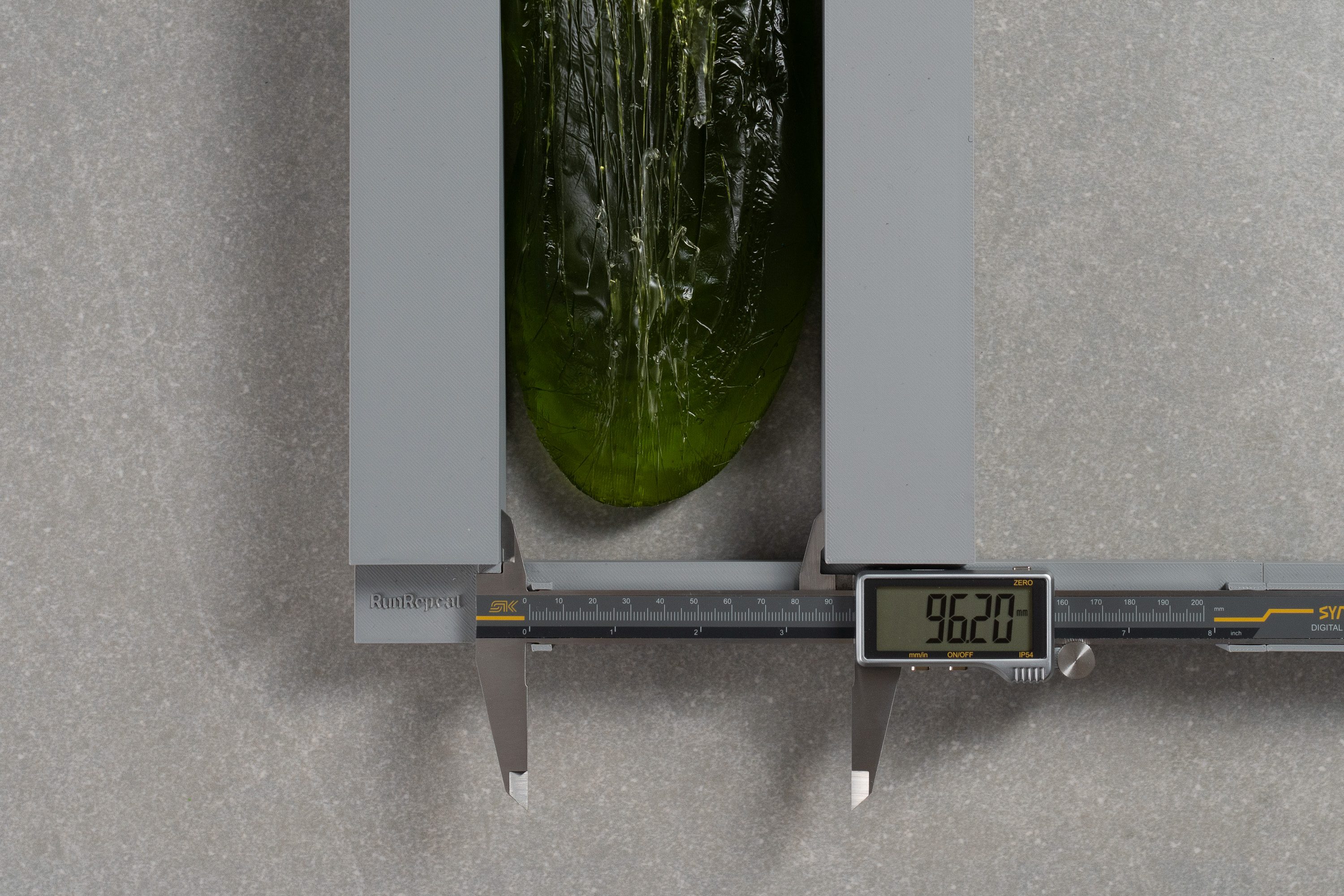
| LeBron 23 | 96.2 mm |
| Average | 92.8 mm |
Toebox width
But please note that its toebox still tapers towards the toes, narrowing down to an average width of 69.9 mm in the big toe area.
So, overall, we can describe this LeBron shoe's fit as moderately accommodating.
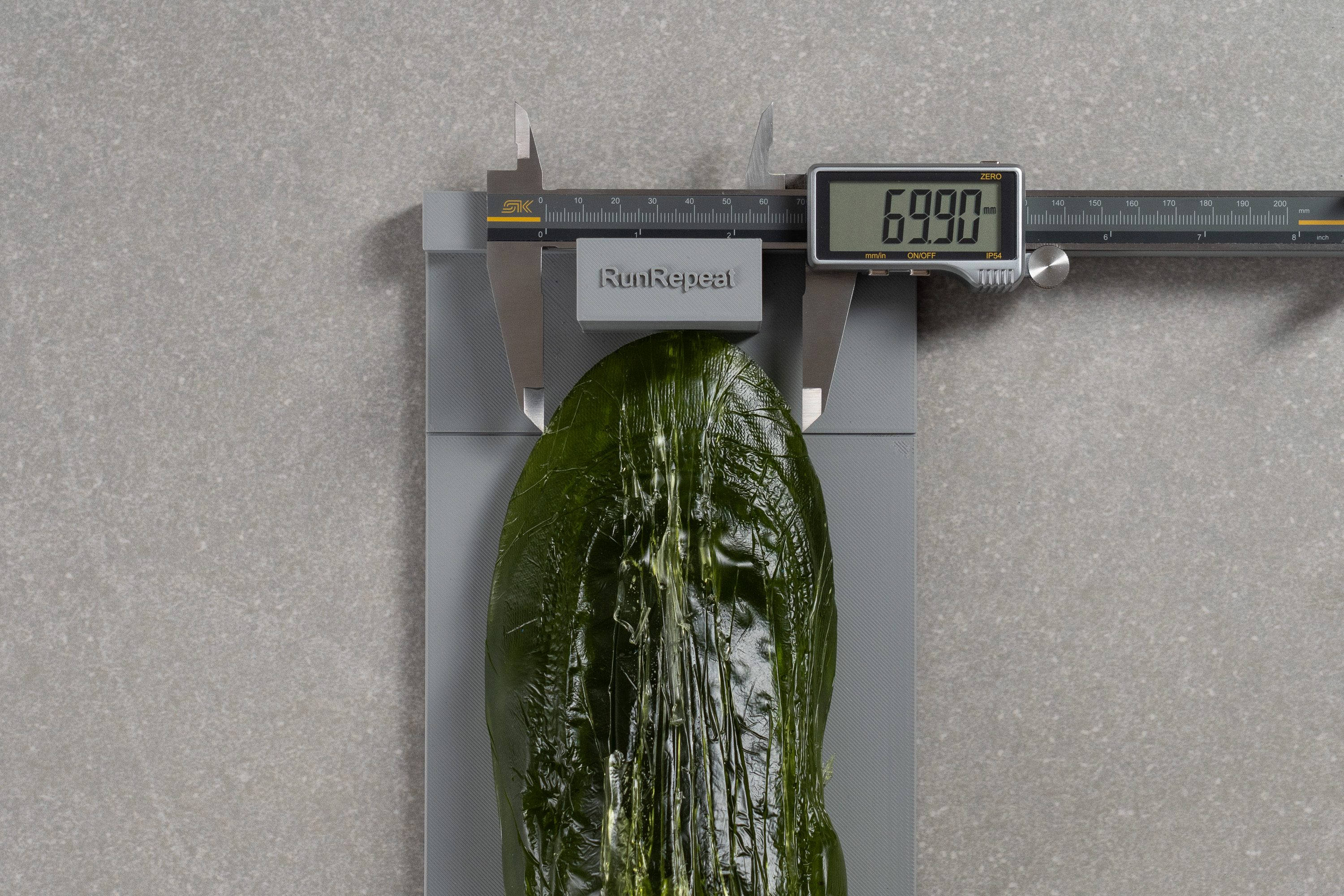
| LeBron 23 | 69.9 mm |
| Average | 69.3 mm |
Toebox height
But here is the caveat - if you have any toe deformities (like hammertoe) or toenail problems (black or ingrown toenails), you will be in trouble in the Nike LeBron 23.
The shoe's vertical space is punishingly low! Measuring its toebox height at only 20.8 mm, we found that it is one of the lowest we've ever recorded in our lab!
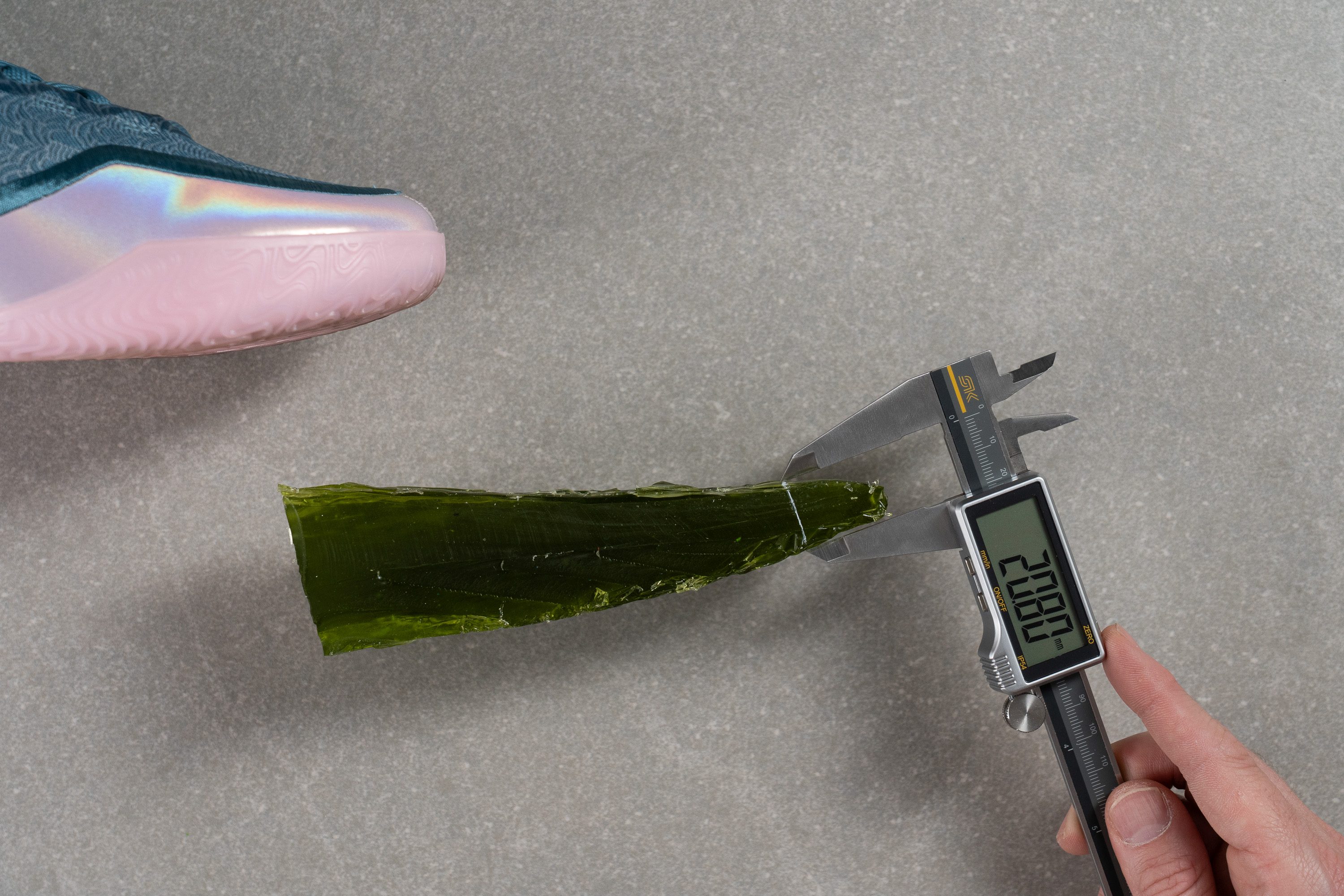
| LeBron 23 | 20.8 mm |
| Average | 23.5 mm |
Traction / Grip
Forefoot traction
Paying £210 for a signature basketball shoe, we expect nothing less than stellar grip. And the LeBron 23 delivers!
Touted as 'sticky and squicky' by Nike, the shoe's outsole returned a high friction coefficient of 0.77 in our traction test. It's not as tacky as the previous LeBron 22 (0.95), but it does feel a little more fluid in a controlled way.
| LeBron 23 | 0.77 |
| Average | 0.75 |
Outsole design
The LeBron 23's outsole is segmented with large cutouts, reducing the contact area slightly but not critically as far as traction is concerned. But on the bright side, these grooves also help to reduce the shoe's weight and stiffness.
The undulating tread pattern on the shoe's translucent rubber outsole also proved its worth in our grip tests.
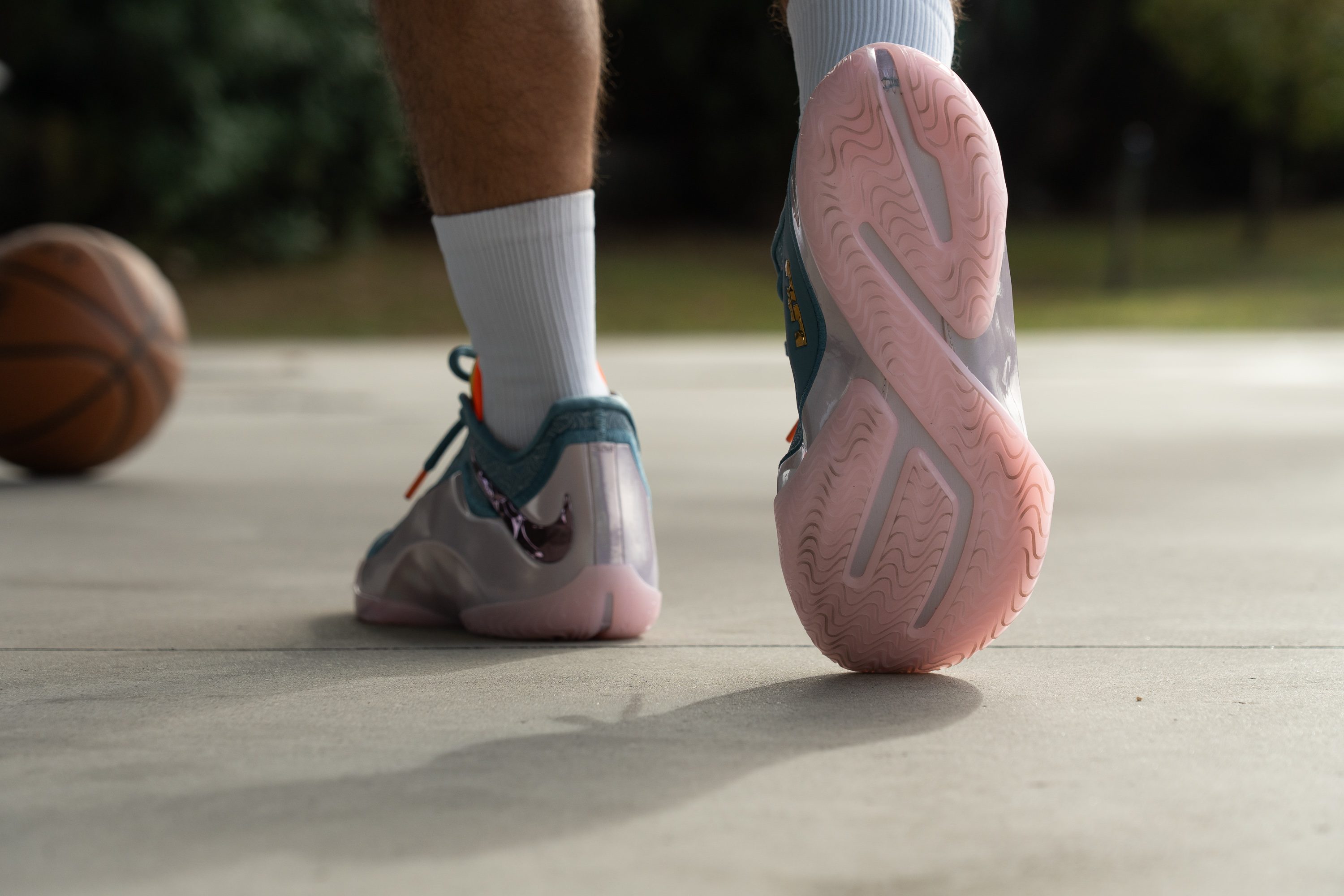
Flexibility / Stiffness
While Nike's decision to embed the LJ Crown logo into the shoe's plastic sidewalls undoubtedly adds some visual flair, we wondered whether it comes at the expense of flexibility.
Gladly, our shoe stiffness test showed that there is nothing to worry about. The Nike LeBron 23 takes just as much force to bend by 30 degrees (20.1N) as the average basketball shoe. Its plastic crown dips in the spot where the foot bending occurs.
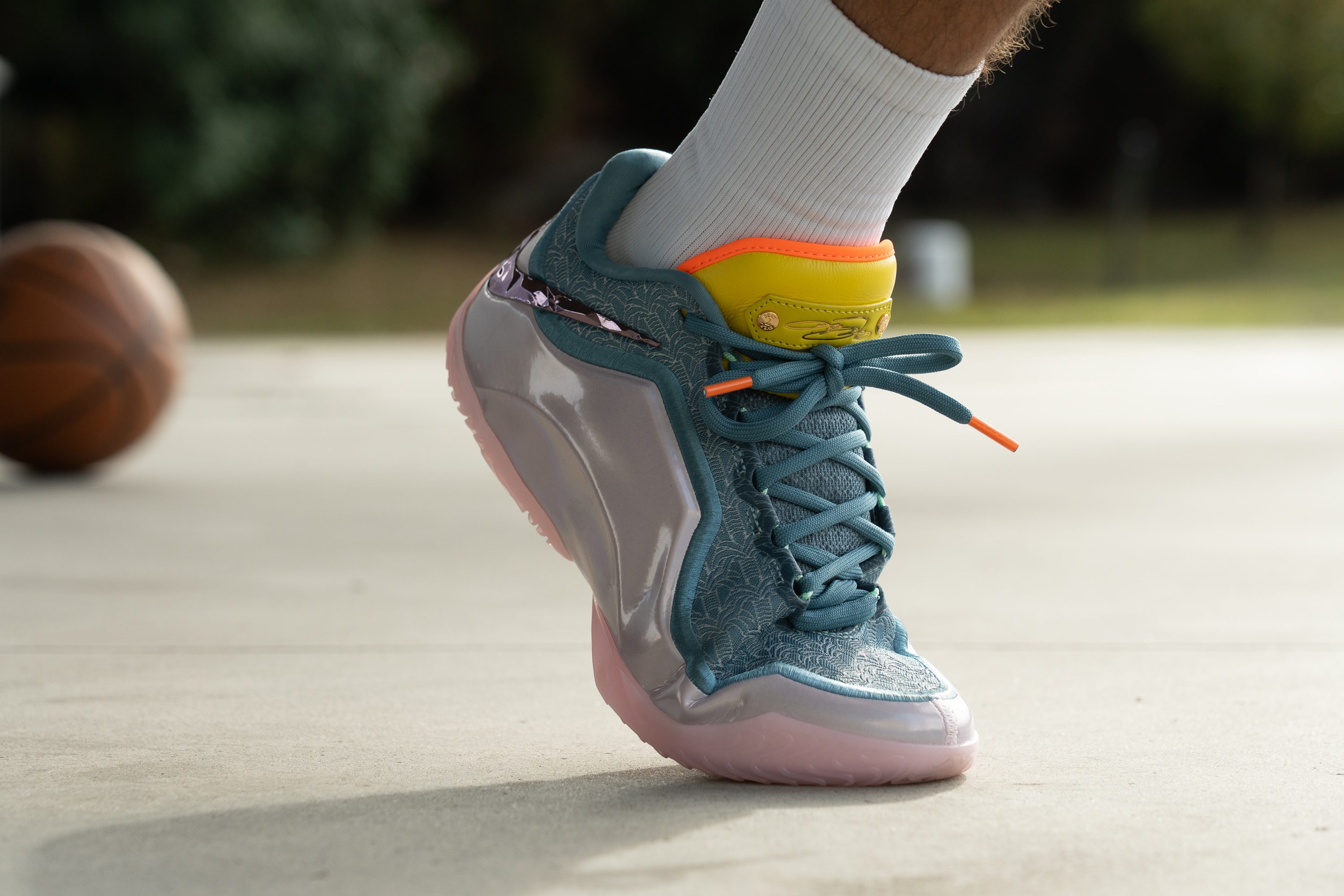
The only knock we have on this design is that the plastic material creases way too easily.
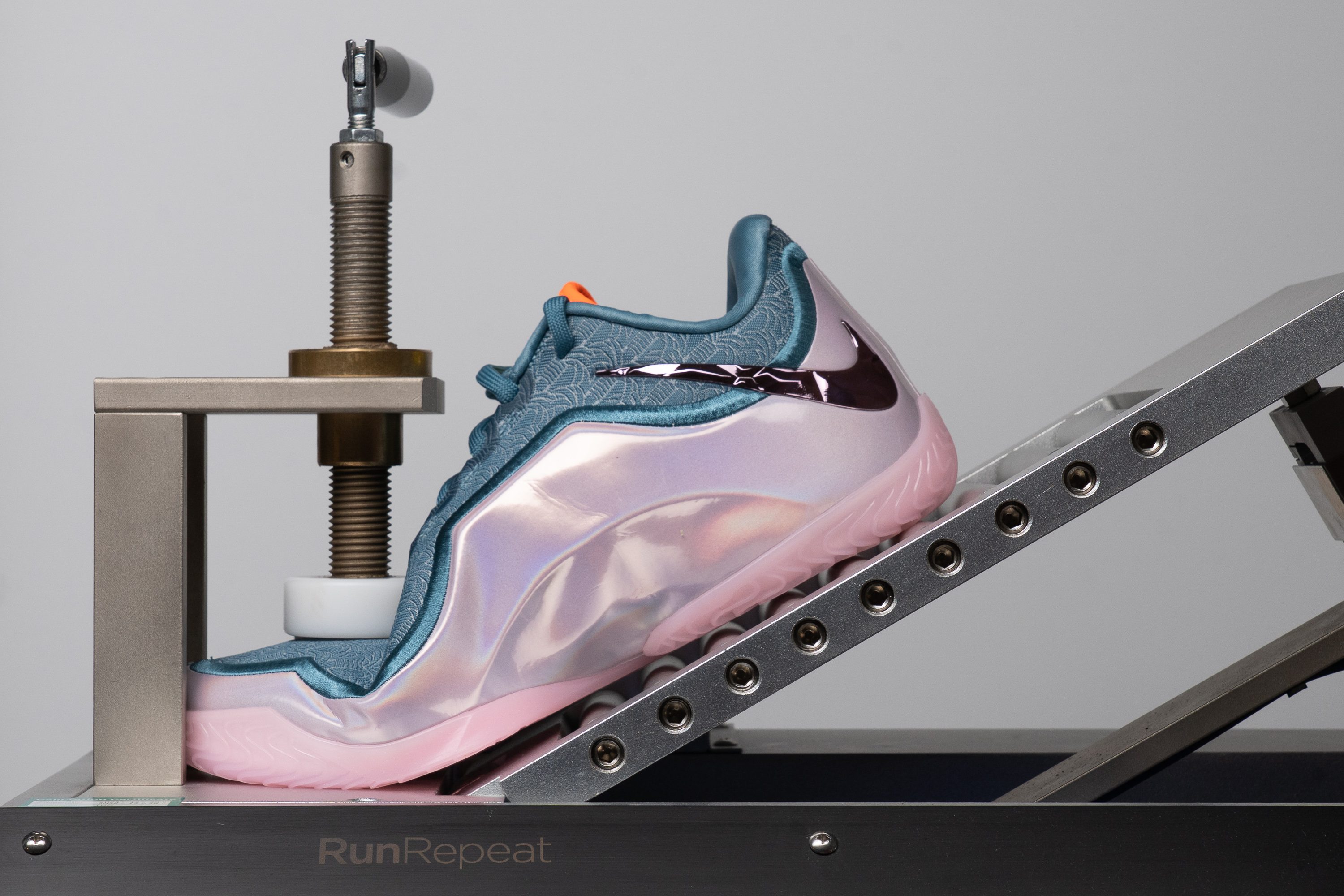
| LeBron 23 | 20.1N |
| Average | 20.5N |
Weight
We have some reservations about the term 'lightweight luxury', which Nike uses to describe the LeBron 23. Just like the preceding iteration, it still makes one of the heaviest hoop shoes in our roster.
In a men's US size 9, the shoe returned 15.5 oz (439g). For reference, this is as heavy as the Nike G.T. Jump 2. Meanwhile, the Air Jordan XXXIX is a notably lighter alternative at 13.9 oz (394g).
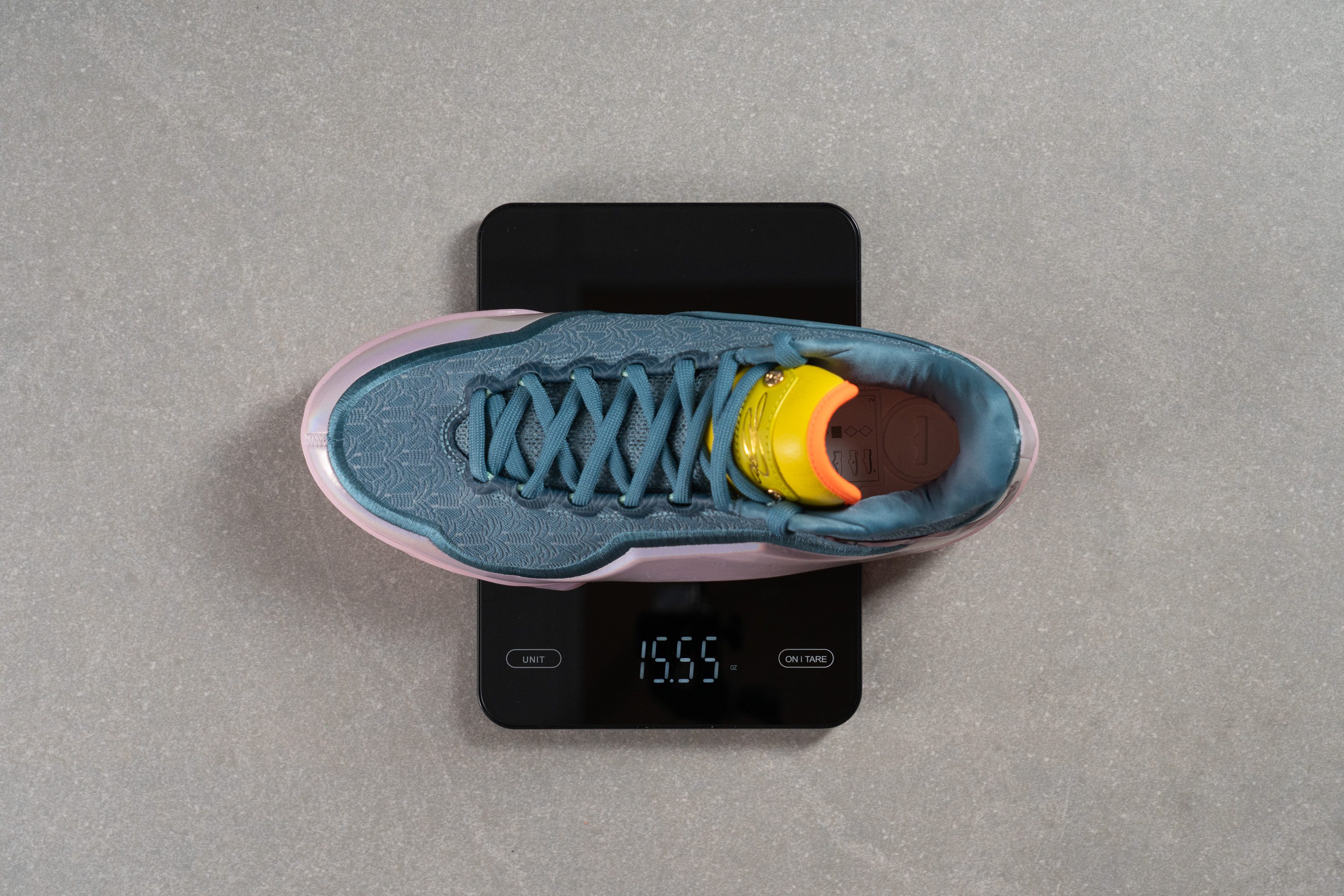
| LeBron 23 | 15.5 oz (439g) |
| Average | 13.8 oz (391g) |
Breathability
Even though Nike swapped leather for textile in the LeBron 23, it didn't help to improve breathability at all.
The airflow proved to be absent even in the shoe's toebox, where the upper is not covered by any plastic.
No ventilation channels showed up anywhere in the shoe's upper, either. The tongue and the quarters are equally dense.
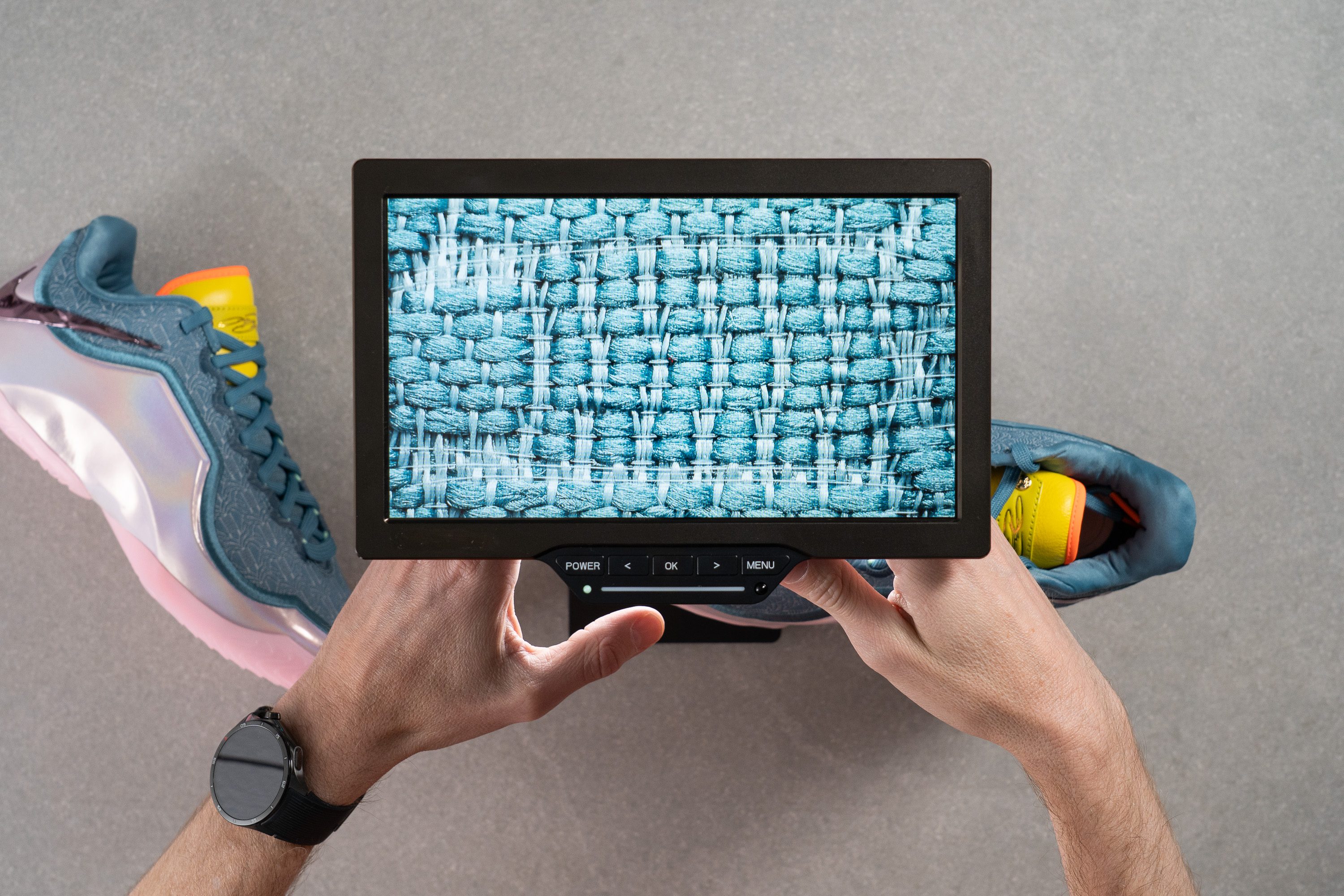
Looking at the shoe's primary jacquard fabric through a microscope also helped to reveal just how thick and tight the weaves are.
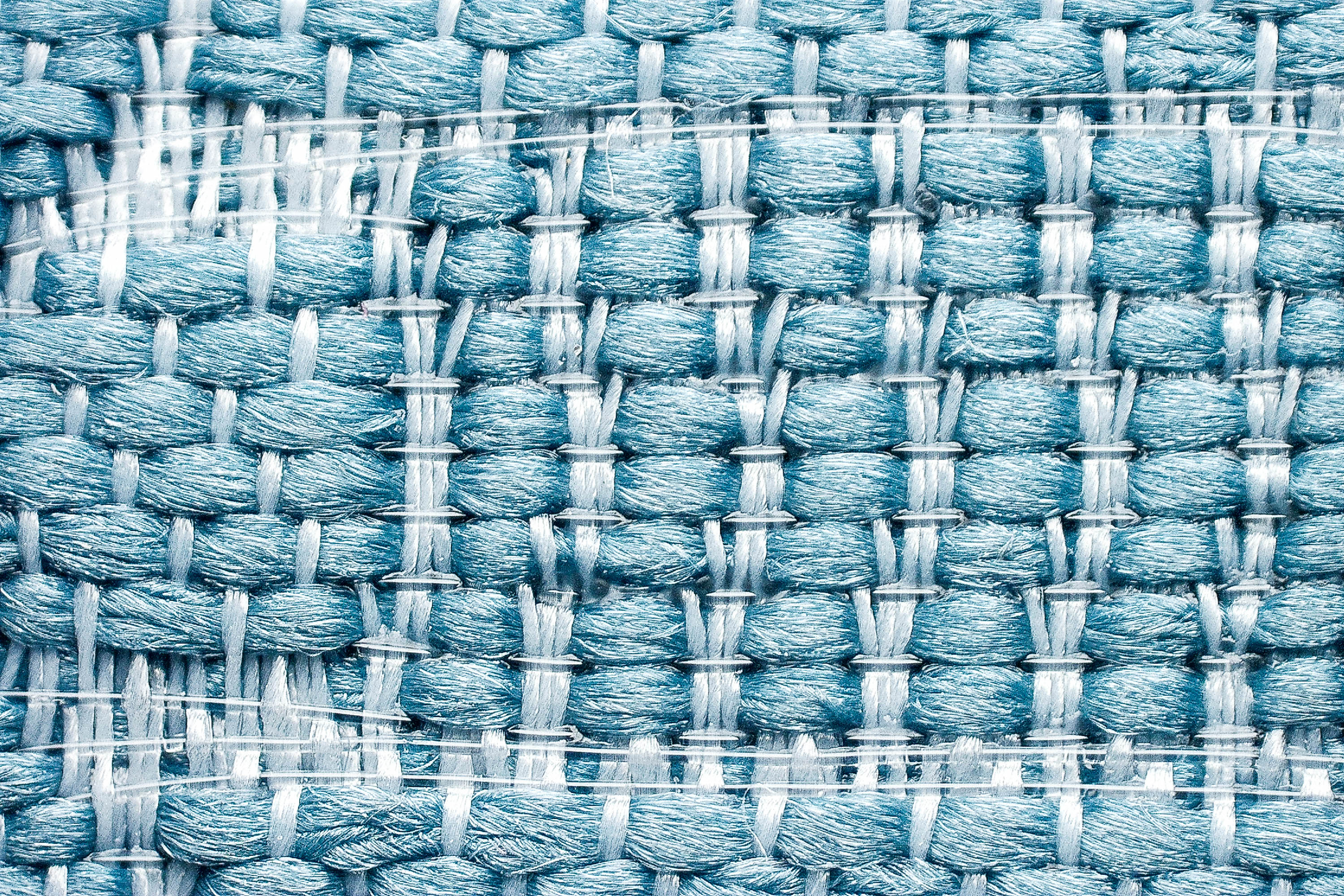
In other words, skip this shoe if you hate the feeling of hot and sweaty feet because it got our lowest breathability score (1 out of 5).
| LeBron 23 | 1 |
| Average | 2.5 |
Stability
Lateral stability test
The ankle support and lateral stability of the Nike LeBron 23 are nothing short of fantastic!
Aside from the obvious external components (the plastic crown-shaped overlays), the shoe is also equipped with stabilising inner workings (the carbon fibre plate in the midfoot).
Torsional rigidity
In addition to giving the LeBron 23 a major boost in energy return, the carbon plate in its midfoot also creates an extra-rigid structure that prevents the shoe (and the foot and ankle, for that matter) from excessive twisting.
The plate's tandem with the 'LJ' overlays forms an impossible-to-twist setup, earning our highest torsional rigidity score - 5 out of 5!
| LeBron 23 | 5 |
| Average | 4.5 |
Heel counter stiffness
The back of the shoe proved to be equally stiff and sturdy, scoring the LeBron 23 another maximum rigidity score of 5/5.
Its tough and immensely padded heel counter clasps around the heel and ankle like there's no turning back! Its secure lockdown allows zero shifting and wobbling during explosive crossovers, drives, or defensive slides.
| LeBron 23 | 5 |
| Average | 3.8 |
Midsole width - forefoot
Even though Nike trimmed down the LeBron 23's outsole in the midsole, it still ensured a reliable forefoot outrigger for stability and sufficient push-off area.
Measuring its width between the most distant points, our calliper showed a solid above-average reading of 119.7 mm.
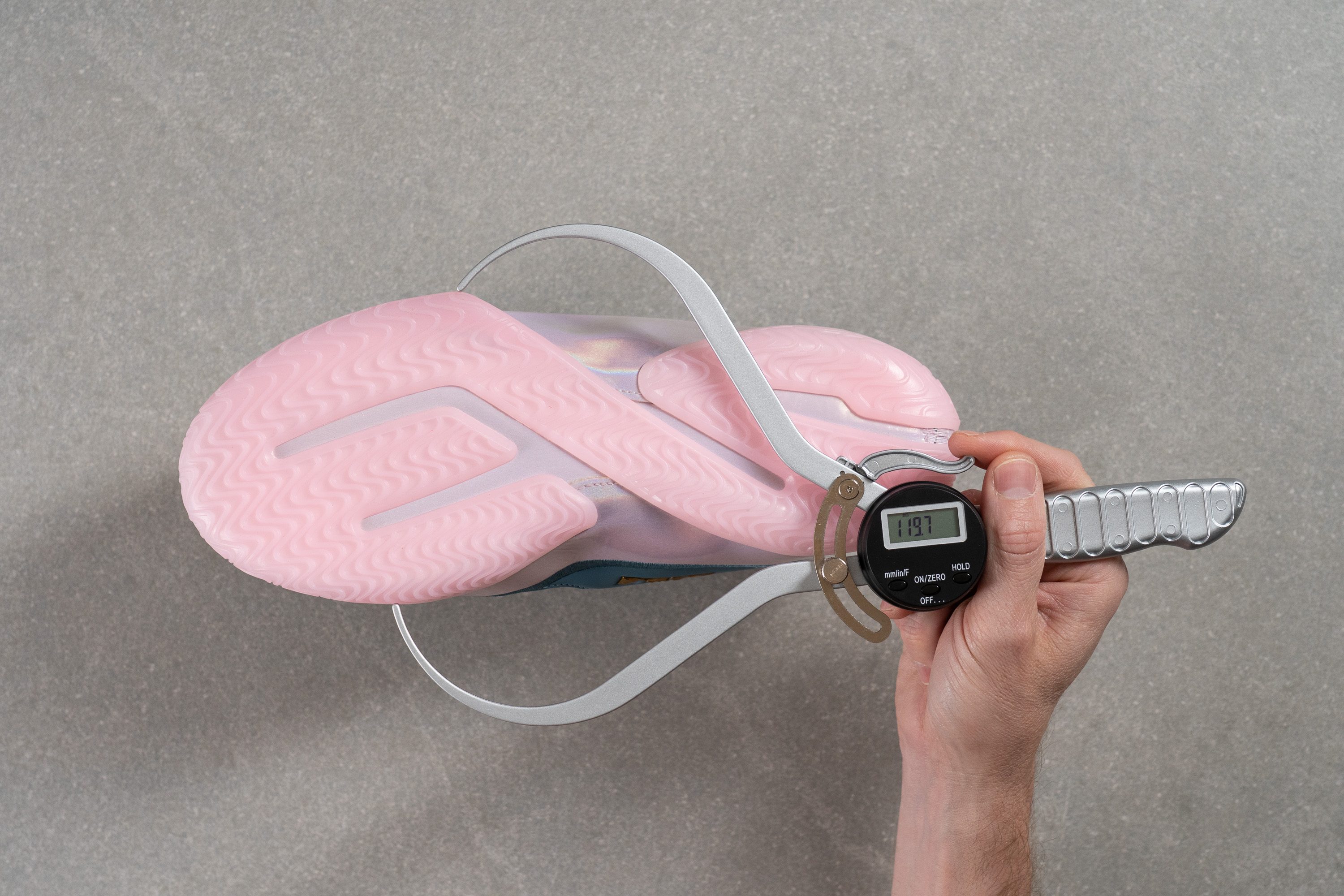
| LeBron 23 | 119.7 mm |
| Average | 114.8 mm |
Midsole width - heel
The heel, on the other hand, is on the slimmer side, showing 87.4 mm. This is slightly narrower than average but not at all critical for the shoe's overall stability.
In fact, the heel width of all the Nike LeBrons we've tested (20 and later) hovers around 90 mm.
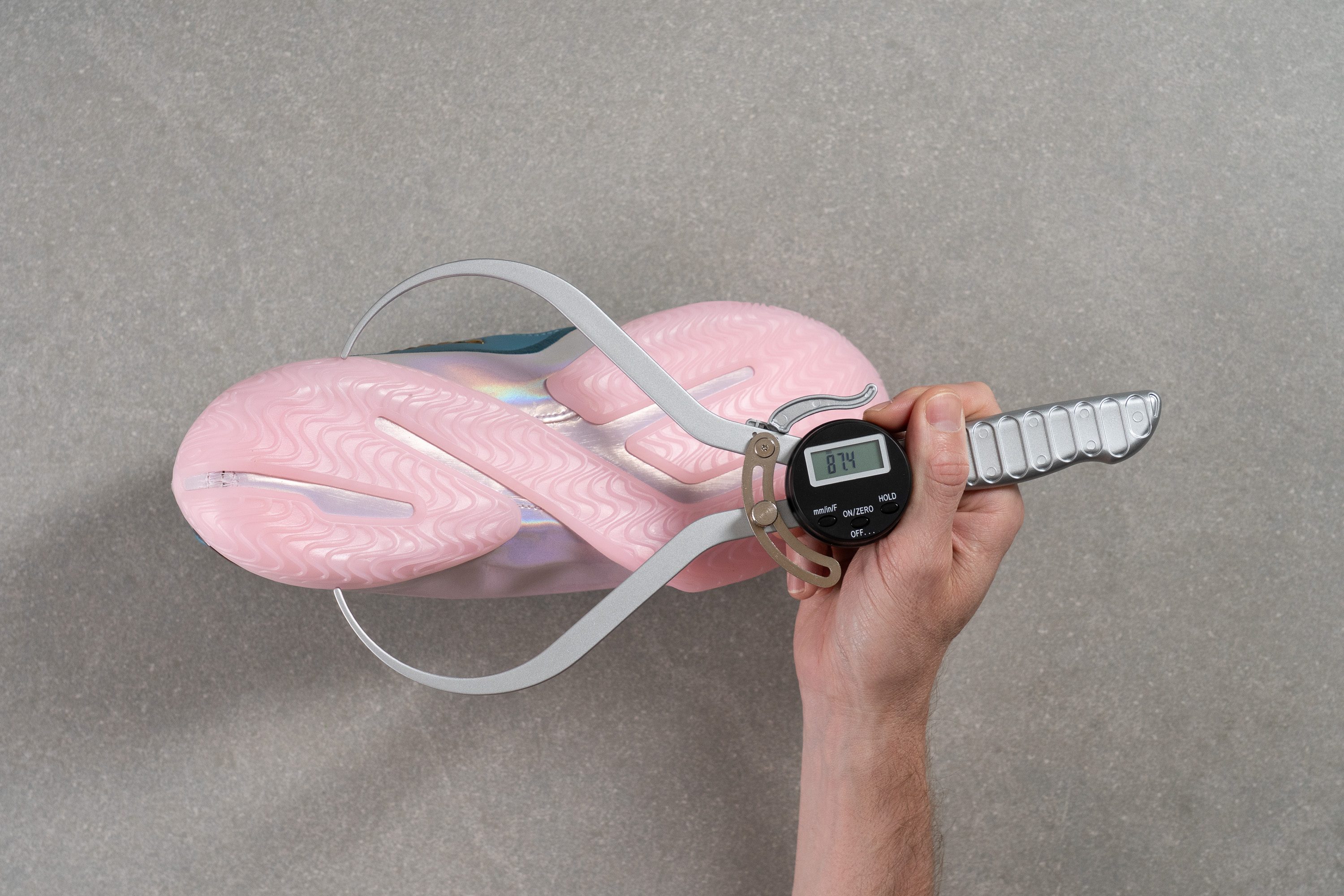
| LeBron 23 | 87.4 mm |
| Average | 89.7 mm |
Durability
Toebox durability
Don't let the cute palm-tree embroidery trick you - that jacquard fabric on the LeBron 23 is built to last!
Drilling it ruthlessly with our Dremel for 12 seconds, the material didn't give in one bit! Strong like LeBron himself, it earned the highest toebox durability score of 5/5!
It is sure ready to get stepped on in traffic!
| LeBron 23 | 5 |
| Average | 3.7 |
Heel padding durability
The LeBron 23 hits the highest marks on the inner side of the shoe as well, thanks to its premium bootie lining. The material proved its elite nature against the Dremel, scoring the highest 5/5 for heel padding durability easily!
| LeBron 23 | 5 |
| Average | 3.7 |
Outsole durability
The shoe's translucent rubber also stood up to the challenge, even through the Dremel speed was set as high as 10K RPM.
With a shallow dent depth of 0.9 mm, it will take a minute to blow through the outsole of this LeBron shoe on hardwood.
However, we cannot say the same about the shoe's outdoor performance. We doubt that its thin treadlines can survive on the blacktop for long.
| LeBron 23 | 0.9 mm |
| Average | 1.0 mm |
Outsole thickness
The amount of outsole rubber also boosts our confidence in the shoe's indoor lifespan, with a calliper reading of 4.0 mm.
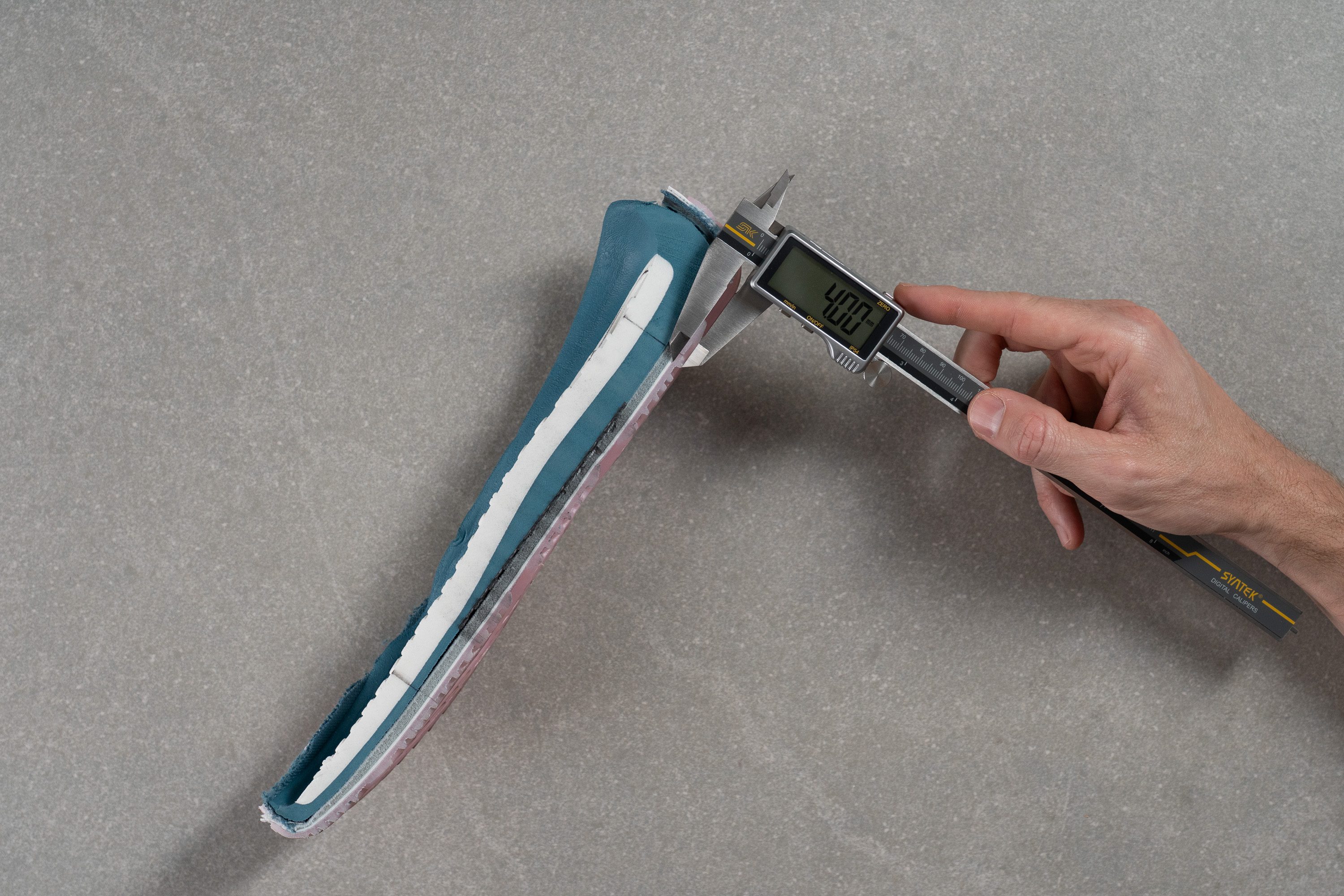
| LeBron 23 | 4.0 mm |
| Average | 4.0 mm |
Misc
Insole thickness
Take this section with a grain of salt because, technically, the Nike LeBron 23 does not have an insole. But if you're curious about the thickness of its drop-in midsole, our calliper recorded it at 20.2 mm.
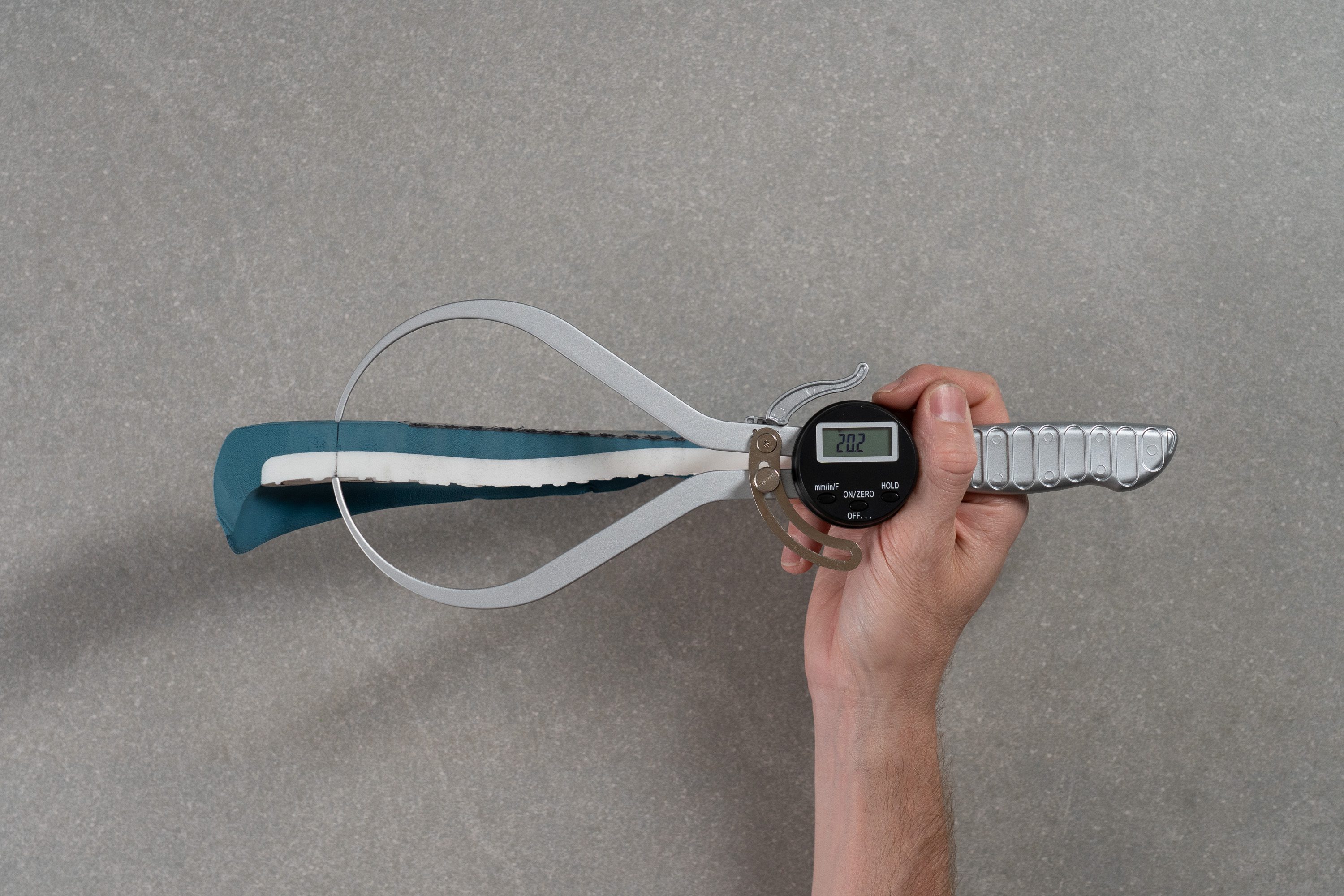
| LeBron 23 | 20.2 mm |
| Average | 4.9 mm |
Removable insole
Even though you can physically take the midsole out, you don't want to do that because that's the core of this LeBron shoe's exceptionally bouncy cushioning.
| LeBron 23 | No |
Tongue padding
We found the LeBron 23 to be even more generously padded than its predecessor, especially with its double padding in the tongue!
The latter reached an above-average mark of 11.2 mm on our calliper. That's an awesome buffer against lace bits and pressure.
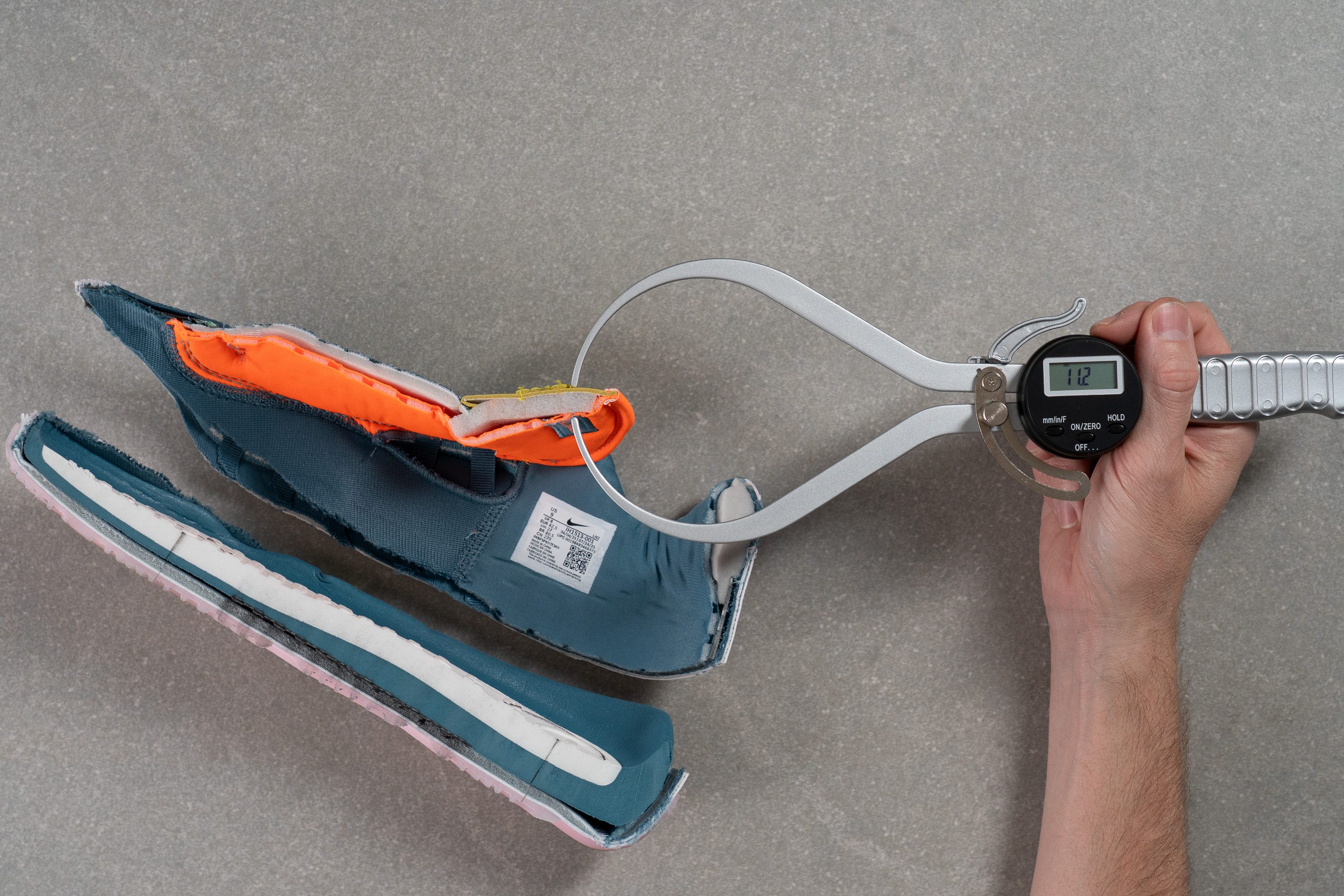
| LeBron 23 | 11.2 mm |
| Average | 9.3 mm |
Tongue: gusset type
The shoe's tongue is semi-gusseted, meaning that its bootie sleeve goes up only halfway up the tongue. However, that's more than enough considering all the other supportive lateral features of this hoop shoe.
One of such features includes the webbings that stretch from the eyelets all the way to the midsole. They clasp around the midfoot when the laces are cinched.
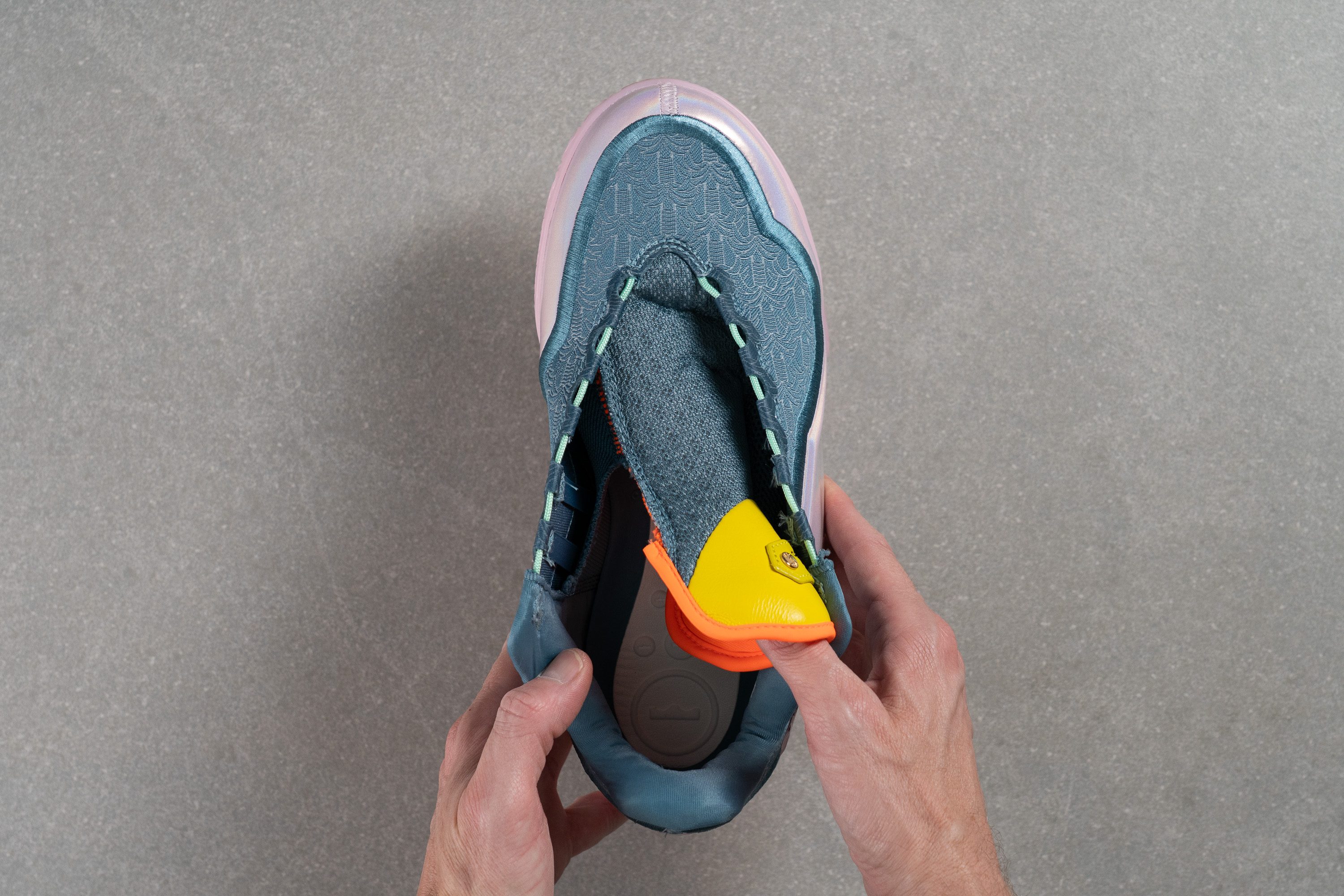
| LeBron 23 | Both sides (semi) |
Heel tab
No pull tabs or finger loops on this shoe, but it's easy to slide in and out.
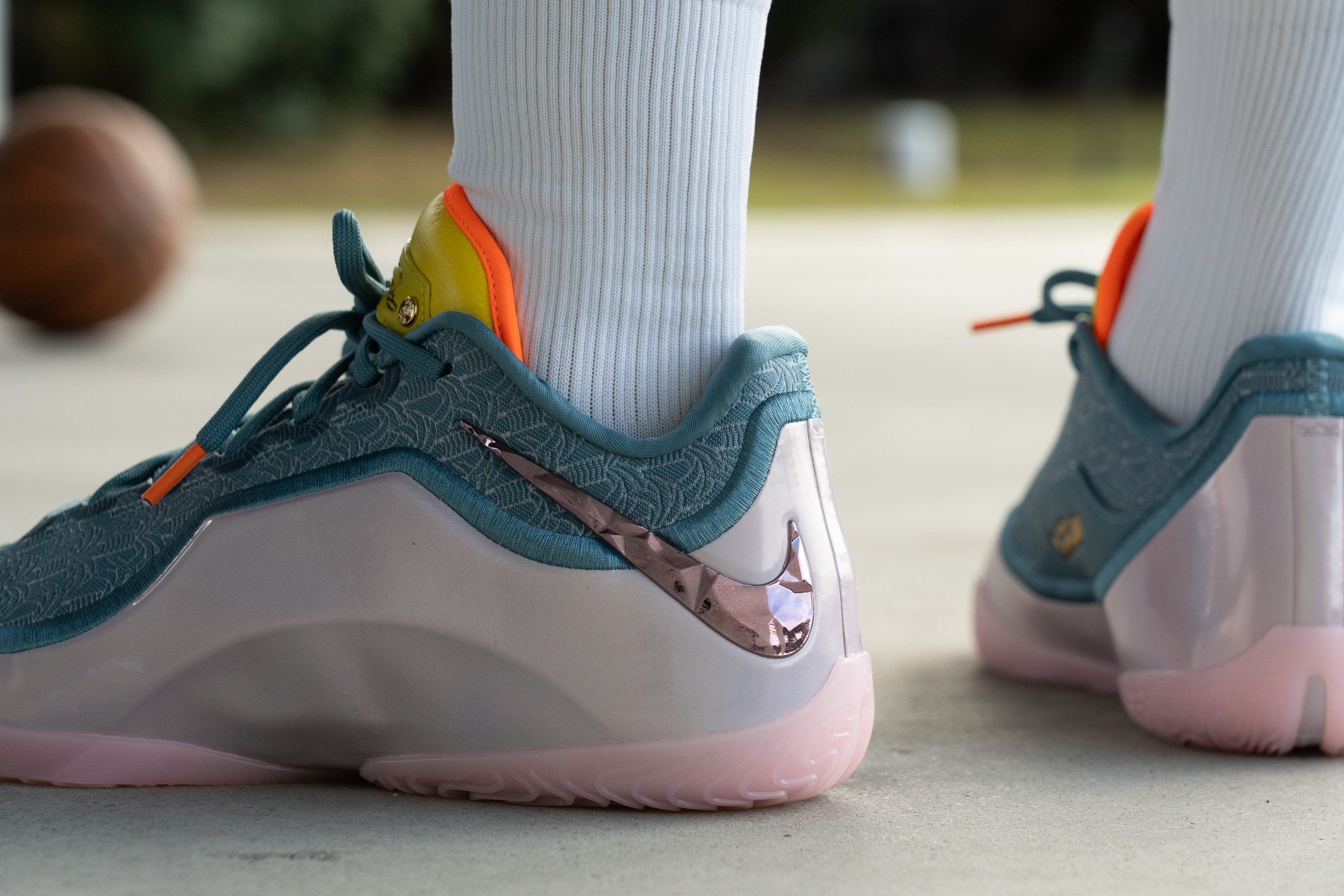
| LeBron 23 | None |
Price
We struggle to name a recent Nike shoe release that didn't get a price hike, but the LeBron series took it to the max with a whopping £20 jump (from £190 to £210)!
As the brand's most expensive basketball shoe, the LeBron 23 is followed by the Air Jordan 40 at £205.
In our opinion, it sure is an exceptionally well-cushioned, durable, stable, and grippy shoe that's worth the higher price point. However, we still find it hard to justify such a drastic price increase, considering that the expensive Zoom Air units were taken out of the shoe formula this time around.
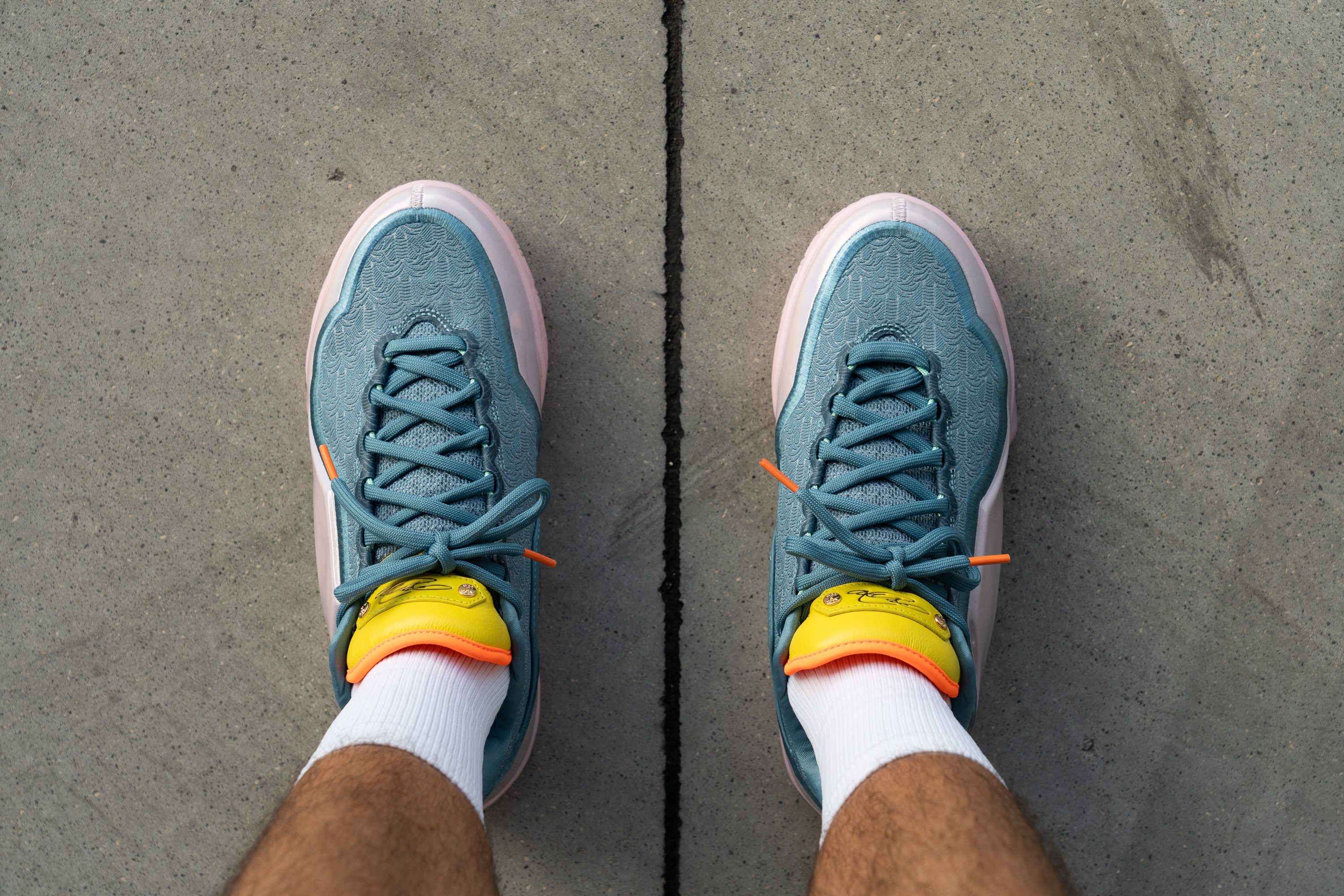
| LeBron 23 | $210 |

